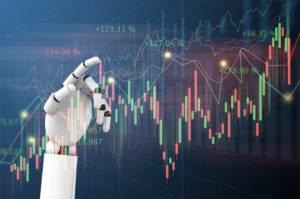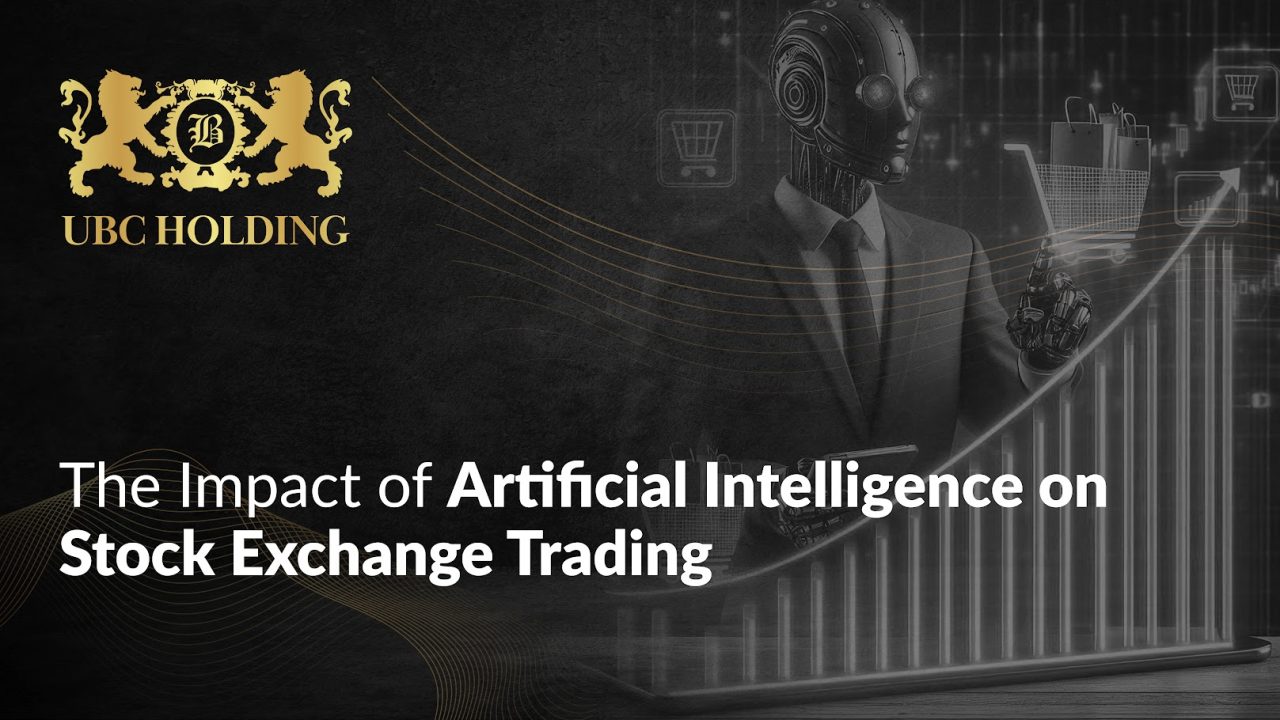In the rapidly evolving financial sector, artificial intelligence (AI) has emerged as a transformative force. “Artificial Intelligence on Stock Exchange” is revolutionizing how trading, risk management, and investment strategies are approached. As we delve into 2024, AI’s role in the stock exchange becomes more critical, offering unprecedented efficiencies and insights. This article explores the best practices, innovations, and future trends of Artificial Intelligence on Stock Exchange, emphasizing its impact and potential.
The Rise of Artificial Intelligence on Stock Exchange

Historical Context
The integration of technology in stock trading isn’t new, but the advent of AI has marked a significant milestone. Traditionally, stock trading relied on human judgment and manual processes. The introduction of computers and algorithmic trading in the late 20th century set the stage for more sophisticated methods. However, it is the application of AI that has brought about a paradigm shift, enabling more precise and real-time decision-making.
Key Milestones
Several key milestones highlight the rise of Artificial Intelligence on Stock Exchange. The early 2000s saw the initial application of machine learning in trading algorithms. The 2010s brought significant advancements in big data analytics, allowing for more comprehensive data processing. Recently, deep learning and neural networks have enabled more sophisticated analyses, including predictive modeling and sentiment analysis. These advancements have collectively transformed the landscape of stock trading.
Innovations in Artificial Intelligence on Stock Exchange
1. Predictive Analytics
Predictive analytics is at the heart of AI applications in stock trading. By analyzing historical and real-time data, AI can identify patterns and trends that may not be apparent to human analysts. This capability allows traders to make more informed decisions and forecast market movements with greater accuracy. Innovations in predictive analytics include the use of advanced machine learning algorithms and the integration of diverse data sources, such as social media sentiment and economic indicators.
2. Algorithmic Trading
Algorithmic trading, driven by AI, has revolutionized stock trading. AI algorithms can execute trades at high speeds and with precision, far beyond human capabilities. These algorithms analyze vast amounts of data to identify trading opportunities and execute trades automatically. Recent innovations in algorithmic trading include the use of reinforcement learning, where AI systems learn from their trading experiences to improve performance continually.
3. Sentiment Analysis
Sentiment analysis is another significant innovation in Artificial Intelligence on Stock Exchange. AI systems use natural language processing (NLP) to analyze text data from news articles, social media, and financial reports. By gauging the sentiment of these sources, AI can predict how market sentiment might impact stock prices. This real-time analysis provides traders with valuable insights into market movements and helps them make informed decisions.
4. Risk Management
Effective risk management is crucial in stock trading, and AI enhances this process by providing real-time risk assessments and predictive analytics. AI systems can identify potential risks, such as market volatility or adverse economic conditions, and suggest mitigation strategies. Innovations in AI-driven risk management include the use of deep learning models to analyze complex risk factors and the integration of AI with blockchain technology for transparent and secure risk management solutions.
5. Fraud Detection
Fraud detection is a critical application of Artificial Intelligence on Stock Exchange. AI systems can analyze transactional data to detect unusual patterns that may indicate fraudulent activities. By identifying anomalies and flagging suspicious transactions, AI helps maintain the integrity of financial systems. Recent innovations in fraud detection leverage advanced machine learning techniques to stay ahead of increasingly sophisticated fraudulent schemes, ensuring robust protection for financial institutions and their clients.
Applications of Artificial Intelligence on Stock Exchange

Investment Strategies
AI is transforming investment strategies by providing deeper insights and more accurate predictions. AI-driven investment platforms can analyze vast amounts of data to identify investment opportunities, assess risks, and optimize portfolios. These platforms use predictive analytics, sentiment analysis, and real-time data processing to provide personalized investment recommendations. The integration of AI in investment strategies enables investors to make data-driven decisions and achieve better financial outcomes.
Portfolio Management
Portfolio management is another area where Artificial Intelligence on Stock Exchange is making a significant impact. AI systems can monitor and manage investment portfolios in real-time, adjusting asset allocations based on market conditions and risk profiles. This dynamic approach to portfolio management helps optimize returns while minimizing risks. AI-driven portfolio management tools also provide detailed analytics and performance reports, offering valuable insights to investors and portfolio managers.
High-Frequency Trading
High-frequency trading (HFT) involves executing a large number of orders at extremely high speeds. AI has become integral to HFT by enhancing the ability to process and analyze data at unprecedented speeds. AI algorithms can identify and exploit short-term market inefficiencies, enabling traders to execute a high volume of trades in milliseconds. The application of AI in HFT ensures precision, speed, and the ability to manage large-scale transactions efficiently.
Regulatory Compliance
Regulatory compliance is a critical aspect of the financial industry, and AI plays a vital role in ensuring adherence to regulatory requirements. AI systems can analyze transactions, monitor compliance with regulations, and detect potential violations. Innovations in AI-driven regulatory compliance include the use of machine learning to identify compliance risks and the integration of AI with blockchain technology for transparent and immutable record-keeping. These advancements help financial institutions navigate complex regulatory landscapes and avoid costly penalties.
Market Surveillance
Market surveillance involves monitoring trading activities to detect and prevent market abuse and manipulation. AI enhances market surveillance by analyzing trading patterns and identifying unusual activities that may indicate market manipulation. AI systems can process large volumes of data in real-time, providing regulators and financial institutions with the tools to detect and respond to suspicious activities swiftly. This application of AI ensures the integrity and fairness of the stock market.
Future Trends in Artificial Intelligence on Stock Exchange

Explainable AI
One of the emerging trends in Artificial Intelligence on Stock Exchange is the development of explainable AI. Traditional AI models often operate as “black boxes,” making it difficult to understand how they arrive at their conclusions. Explainable AI aims to make AI systems more transparent and interpretable. In stock trading, this means providing clear explanations for AI-driven predictions and recommendations, enhancing trust and enabling better decision-making. Explainable AI is particularly important in regulatory contexts, where transparency is crucial for compliance.
Integration with Blockchain
The integration of AI with blockchain technology is another promising trend in Artificial Intelligence on Stock Exchange. Blockchain provides a secure and transparent way to record transactions, while AI can analyze blockchain data to detect patterns and anomalies. This combination offers significant advantages in areas such as fraud detection, risk management, and regulatory compliance. In the future, we can expect to see more financial institutions leveraging the synergies between AI and blockchain to enhance their operations and security.
Quantum Computing
Quantum computing holds the potential to revolutionize Artificial Intelligence on Stock Exchange by providing unprecedented computational power. Quantum computers can process complex calculations much faster than classical computers, enabling the analysis of vast amounts of data in real-time. This capability can enhance predictive analytics, risk assessment, and portfolio optimization. Although quantum computing is still in its early stages, ongoing research and development are expected to bring significant advancements in the coming years, transforming the landscape of AI in stock trading.
Personalized Financial Services
AI is paving the way for personalized financial services, offering tailored solutions based on individual preferences and needs. AI-driven platforms can analyze user data to provide personalized investment recommendations, financial planning advice, and credit scoring. This trend is driven by the growing demand for customized financial services that cater to unique financial goals and risk profiles. In the future, we can expect to see more financial institutions adopting AI to offer highly personalized and user-centric financial solutions.
Ethical and Responsible AI
As AI becomes more prevalent in the stock exchange, there is a growing emphasis on ethical and responsible AI. Ensuring that AI systems operate fairly, transparently, and without bias is crucial for maintaining trust and integrity in the financial industry. Ethical considerations include data privacy, algorithmic fairness, and accountability. In the future, we can expect to see more regulations and guidelines promoting ethical AI practices, as well as ongoing efforts to develop AI models that are aligned with societal values and ethical standards.
Case Studies of Artificial Intelligence on Stock Exchange in Action
Case Study 1: Renaissance Technologies
Renaissance Technologies, a prominent hedge fund, has been at the forefront of using AI in stock trading. The firm’s Medallion Fund uses complex AI algorithms to analyze vast amounts of data and identify profitable trading opportunities. This approach has enabled Renaissance Technologies to achieve consistently high returns, demonstrating the power of AI in enhancing investment performance and managing risks. The success of Renaissance Technologies highlights the potential of Artificial Intelligence on Stock Exchange to transform investment strategies.
Case Study 2: Goldman Sachs
Goldman Sachs, a leading global investment bank, has also embraced AI in its trading operations. The firm uses AI algorithms to analyze market data, assess risks, and execute trades. By leveraging AI, Goldman Sachs has improved the efficiency and accuracy of its trading activities, enabling it to better serve its clients. The integration of AI at Goldman Sachs underscores the importance of AI in modernizing stock trading and achieving competitive advantages.
Case Study 3: Nasdaq Market Surveillance
Nasdaq, one of the world’s largest stock exchanges, uses AI for market surveillance. The exchange employs AI algorithms to monitor trading activities and detect potential market manipulation. By analyzing trading patterns and identifying anomalies, Nasdaq’s AI systems help maintain the integrity of the market and ensure fair trading practices. The application of AI in market surveillance at Nasdaq demonstrates its critical role in enhancing market transparency and protecting investors.
Best Practices for Implementing Artificial Intelligence on Stock Exchange
Ensuring Data Quality

High-quality data is essential for effective AI applications in stock trading. Ensuring that data is accurate, relevant, and up-to-date is crucial for developing reliable AI models. Best practices for data management include implementing robust data governance frameworks, using advanced data cleaning techniques, and integrating diverse data sources to enrich AI models. Financial institutions should also prioritize data privacy and security to protect sensitive information.
Continuous Learning and Adaptation
AI in stock trading is an evolving field, and continuous learning is essential for staying ahead of the curve. Financial institutions should invest in ongoing training and development for their AI teams, keeping them updated on the latest advancements and best practices. Implementing feedback loops and monitoring AI model performance are also crucial for ensuring that AI systems remain effective and adapt to changing market conditions.
Collaboration and Cross-Disciplinary Teams
Successful implementation of AI in stock trading requires collaboration between various stakeholders, including data scientists, financial analysts, and regulatory experts. Cross-disciplinary teams can bring diverse perspectives and expertise, enhancing the development and implementation of AI solutions. Financial institutions should foster a culture of collaboration and encourage knowledge sharing to drive innovation and achieve better outcomes.
Ethical AI Practices
Ensuring ethical AI practices is crucial for maintaining trust and integrity in stock trading. Financial institutions should implement guidelines and frameworks to promote fairness, transparency, and accountability in AI systems. Regular audits and assessments can help identify and mitigate biases, ensuring that AI models operate in an ethical and responsible manner. Engaging with regulatory bodies and adhering to industry standards can also enhance the credibility and acceptance of AI in stock trading.
Investing in Security
The security of AI systems is paramount, especially in the financial industry. Financial institutions should implement robust security measures to protect AI models and data from cyber threats. Best practices include using encryption, multi-factor authentication, and secure data storage solutions. Regular security assessments and vulnerability testing can help identify and address potential risks, ensuring the safe and reliable operation of AI in stock trading.
Conclusion
“Artificial Intelligence on Stock Exchange” is transforming the financial industry, offering unprecedented insights, efficiency, and accuracy. The innovations and applications of AI in stock trading, from predictive analytics and algorithmic trading to sentiment analysis and risk management, are revolutionizing financial practices and driving better decision-making. As we look to the future, emerging trends such as explainable AI, blockchain integration, and quantum computing hold the potential to further enhance AI’s role in stock trading.
By understanding and embracing these advancements, financial institutions can unlock new opportunities, optimize their operations, and achieve greater success. Implementing best practices, including ensuring data quality, continuous learning, collaboration, ethical AI practices, and investing in security, is essential for maximizing the benefits of AI in stock trading.
Exploring Stock Exchange AI: Innovations and Insights for 2024

